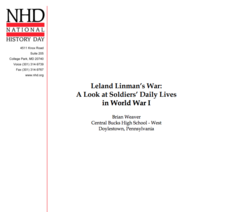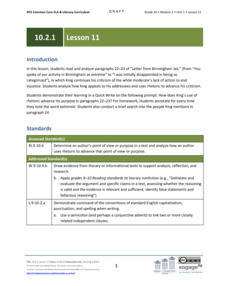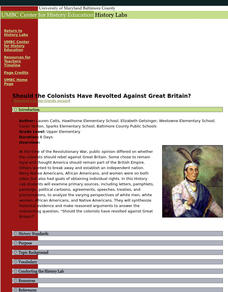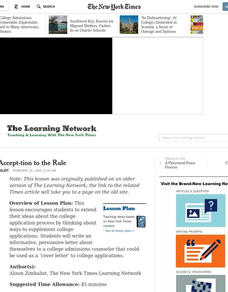National History Day
Leland Linman’s War: A Look at Soldiers’ Daily Lives in World War I
Hunkering down in the trenches of World War I, Leland Linman decided to write a journal about his experiences. By reading Linman's entries in the fourth installment of an eight-part lesson plan series, scholars get a firsthand look at...
EngageNY
Grade 10 ELA Module 2: Unit 1, Lesson 17
Scholars read the final paragraphs written by Martin Luther King Jr. in "Letter from Birmingham Jail." Readers work in groups to discuss King's word choice and point of view by completing graphic organizers. They also respond to a...
Florida Center for Reading Research
Multiple Meaning Words in Context
Multiple meaning words is the focus of a activity designed to reinforce the use of context clues. Scholars listen carefully to a variety of sentences using the words pool and cast to decide which definition best fits the...
EngageNY
Grade 10 ELA Module 2: Unit 1, Lesson 11
Choose your words carefully. Martin Luther King Jr. carefully chooses his words to provide evidence to support his claim about segregation. Scholars work in pairs to discuss previous lessons, complete homework assignments, determine the...
Center for History Education
Should the Colonists Have Revolted Against Great Britain?
Should the Americans have taken the plunge and revolted against Great Britain? Using documents, including the famed Common Sense and a Loyalist response, pupils conduct a lengthy investigation of the question. The interesting resource...
Curated OER
Correspond, Don't Compliment
In this reading and writing analysis activity, high schoolers analyze reader's responses to authors. The goal is for students to determine if the letters are appropriate analytical correspondence or simply letters full of compliments.
Curated OER
The Importance of Being Flexible and Open-minded as a Visitor to Another Culture: Lesson 2 For "The Train Ride Home"
Students examine the advantages of being flexible when visiting or living in a different culture. They read and discuss a first-hand account by a Peace Corps volunteer in Kazakhstan, and write a letter from the point of view of a...
Curated OER
How to Integrate Quotations
Quotations add validity to an argument or an analysis, but how do you integrate them into your writing? Several examples are provided, and your emerging writers will surely benefit from looking at different ways to add quotations....
Curated OER
Do the Write Thing
Students take stands on issues that matter to them. In this philanthropy instructional activity, students read Anne Frank: The Diary of a Young Girl, discuss the act of advocating for others, and write letters of support for issues they...
Curated OER
Up Close with Author Allen Say
Students explore the Asian-American culture. They read several books written by Japanese-American author Allen Say and create questions to ask the author. Students write letters to the author.
Curated OER
Letter from the Chateau
Young scholars write a friendly letter based on their observations of a painting by Poussin.
Curated OER
Word Perfect
Students explore the value of personal written communication as compared to the use of e-mail or text messaging.
Curated OER
College Accept-tion to the Rule
Students extend their ideas about the college application process. They write an informative, persuasive letter about themselves to a college admissions counselor that could be used as a 'cover letter' to college applications.
Curated OER
Fifty Years: From the Little Rock Nine to the Jena Six
Students discuss how the issues surrounding school integration have changed since the Little Rock Nine entered Central High School. They discuss the recent events in Jena, Louisiana. Students write a letter to a school administrator...
Curated OER
Don't Type To Strangers
Students create Web advertisements to protect young people from online predators. For homework, they write letters pitching their ads and analyzing their effect. They discuss their own use of the Internet and how to protect young people.
Curated OER
The Will to Drill?
Learners read a New York Times article about plans for oil drilling in the Arctic. They examine and debate both sides of the plan to explore for oil in the Arctic National Wildlife Refuge.
Curated OER
Letter Analysis
For this primary source analysis worksheet, students analyze historical letters of their choosing and respond to 15 analysis questions about the letters.
Curated OER
"The Tiger Who Came to Tea"
Students complete various activities related to the book "The Tiger Who Came to Tea" by Judith Kerr Collins. They participate in a shared reading activity, list the foods from the story, write and read sentences in speech bubbles, and...
Curated OER
Sincerely Yours
Learners write a friendly letter. They write a friendly letter to author, Cynthia Rylant, after reading a number of her books, and watch a presentation by the teacher that describes how to write the letter. They word process their...
Curated OER
Comparing Poems
Young literary analysts compare two poems by the same author. Readers look for slant rhyme, observe the beat and rhythm of each, and search for repeated vowel sounds. After re-reading, they observe the lack of punctuation and the stanza...
Curated OER
Springfield Wiki Lesson - Literature Circles
Using a variety of novels about survival, such as Julie of the Wolves by Jean Craighead George, pupils create author's studies using wikis. First, learners are placed in groups to study a particular novel. Then, they create a page...
Read Works
Famous Inventors Alexander Graham Bell: You Rang?
Scholars read a brief informational text about the famous inventor, Alexander Graham Bell and his invention of the telephone, then show what they know by way of eight questions—six multiple choice and two short answer.
Curated OER
The Bill of Rights: Debating the Amendments
Provide your class with an opportunity to investigate an important historical document. Without identifying the document, distribute copies of the original Bill of Rights, as transcribed by John Beckley, Clerk of the House of...
Annenberg Foundation
Spirit of Nationalism
What were the virtues and values that helped form America? Pupils watch and discuss a video, read biographies of early Americans, chart the differences between early American religious movements, write journals and letters, draw, and...

























